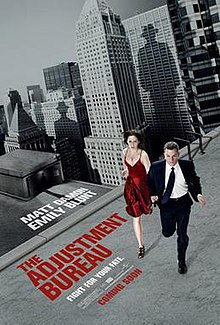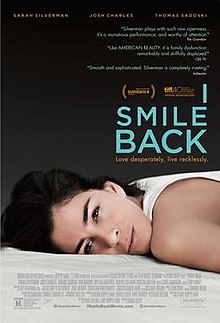
Released: March 4th,
2011
Rated: PG-13
Distributor: Universal Pictures
Starring: Matt Damon, Emily Blunt, Anthony Mackie,
John Slattery
Directed by: George Nolfi
Written by: George Nolfi
Personal Bias Alert: likes the cast, likes old-school sci-fi
7.7 of 10
Floating
in on a puff of fresh air is The
Adjustment Bureau, a sci-fi romance that is the polar opposite of the grim,
desaturated landscapes that dominate modern fantasy. It’s bright and bubbly, begging you to like
it just as much as much as the main characters pine for each other’s
attention. There’s an underrated value
to this sort of film, the kind that’s perfect in just about every situation for
every sort of person. Broad appeal is
nothing to be scoffed at, not when it’s done as assuredly and as winningly as
it is in this film.
Undoubtedly,
the MVPs of this endeavor are Matt Damon and Emily Blunt as the love-struck
leads David and Elise. They’re two
honest-to-god movie stars, enjoyable to watch no matter what they’re doing,
even if that’s just surviving alone in space or singing about a cow in the
woods. When put together their chemistry
crackles, and watching them flirt is one of the more enjoyable things you can
do with your free time. Of course, the
film puts obstacles in their way, in particular a shady group of men in fedoras
who actively prevent them from being together, and their battle against these
men forms the crux of the film.
Many
romance-against-impossible-odds stories falter when the going gets rough primarily
because the relationship isn’t well established. It’s either too rushed or not genuinely felt,
and the audience is left wondering why the pair are fighting so hard to stay
together instead of just moving on. This
is never an issue in The Adjustment
Bureau, not because the antagonists are weak (the fedora-clad group have
some mysterious connection to God), but because Damon and Blunt sell their
romance so well. And the writing backs
them up, making Elise and David engaging, charming folk, which the actors
pounce on and amp it up to 10. How
refreshing it is not to be taunted by a rabble-rousing antihero, but to be
given characters you instantly like, leaving you to worry only about the
machinations of the plot getting in their way.
Adapted
by writer/director George Nolfi from a Philip K. Dick short story, the plot
throws enough thoughtful menace into the mix to give the fluffy romance some
weight. For all the pair have going for
them, it seems plausible throughout that they may not end up together. God is a pretty strong force, after all, even
if he is only referred to in code. Nolfi
plays around with other concepts as well, namely the positives and negatives of
free will, and although it’s not expounded upon, it provides enough layering to
keep the film from being a lightweight.
Hardcore sci-fi fans may be disappointed by the film’s airiness, but
it’s clear that Nolfi didn’t want the audience to get too bogged down by
serious thought.
Where
Nolfi does take some chances, and where he might lose a few viewers, is his
decision to present the film’s action with a punchy realness. Nolfi is a screenwriting alum of the Bourne series, and the imprint of that
can clearly be seen here. When Damon’s
David is under duress, the film becomes shakier and narrows in to the
action. Cars crunch and faces slam, the
blows palpably resonating to the audience.
It would be understandable to find this choice incongruous with the rest
of the film, but Nolfi makes it work, using it to emphasize the fedora men’s
power and to up the ante against our protagonists. This element is sparingly used, taking a
backseat to the overpowering nature of the film’s romance, but it pops up
enough to turn off those severely averse to action. To everyone else, it will simply add a jolt
of energy to the proceedings, making the romantic drive more immediate and in
more real danger.
It’s
this tidy package of action, romance, and science fiction that gives The Adjustment Bureau its broad appeal, and
the winning combination of Matt Damon and Emily Blunt put the film into
rarified air. This satisfying of a crowd-pleaser
doesn’t come along too often, and it’d be a shame to overlook the charm it has
to offer.
Other Notes:
Ø My
one solid negative on this film is the score.
It’s just too basic and too prominent.
Ø I
love this kind of old-school, on-the-nose sci-fi.
Ø This
goes down as one of the best examples of on-screen chemistry I’ve ever seen.







